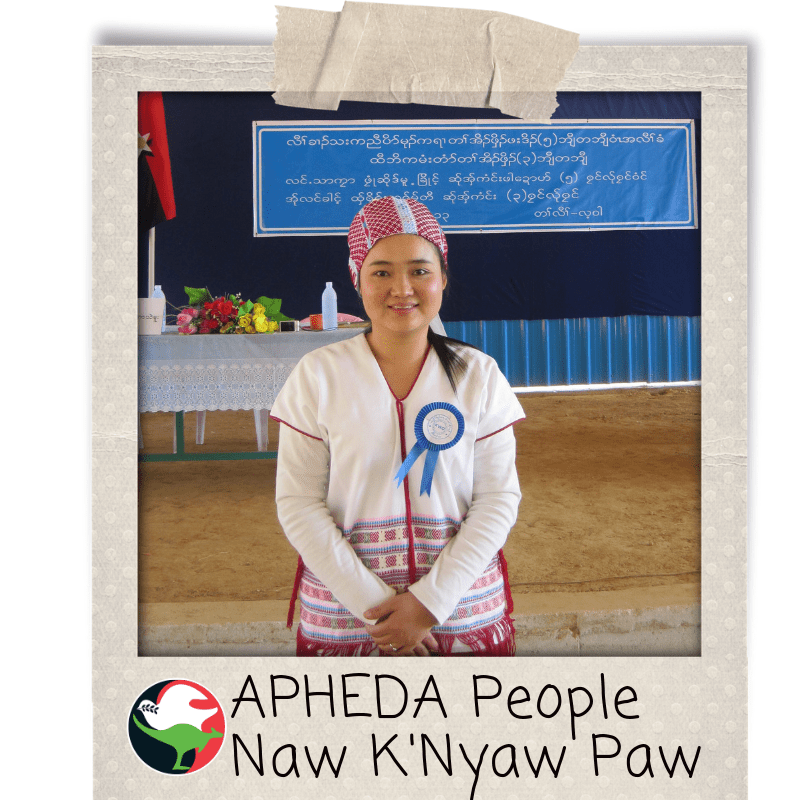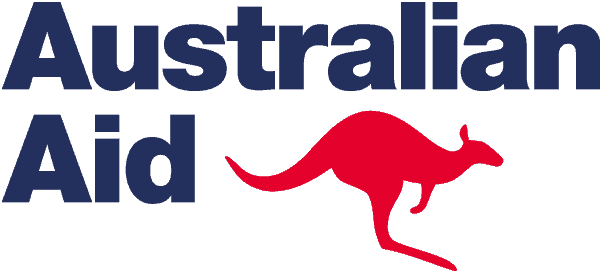Union Aid Abroad-APHEDA is about people – people working together to make things better for all. As the global justice organisation of the Australian union movement, each and every APHEDA supporter, member, partner, activist and participant here in Australia and all around the world contributes to the work it takes to tackle inequality and injustice.
Meet Naw K’ Nyaw Paw
Nyaw Paw
Naw K’nyaw Paw, a Karen woman and refugee, is the General Secretary of the Karen Women’s Organization (KWO), an organisation with over 65,000 members. She is responsible for leading all KWO work and programs as well as implementing policies and goals set by the KWO Congress which meets every 4 years. The KWO is a feminist, indigenous rights, community-based organisation that plays a leadership role in the struggle to bring democracy and human rights to Burma. It focuses on capacity building, increasing and amplifying women’s voices and influence, as well as providing services to women and children.
How long have you been working with KWO and what is your role?
I have been working with KWO since 1999 (20 years!) and in 2013 I was elected to the position of General Secretary. I oversee KWO’s day-to-day work and together with my colleagues we set priorities and policies to guide our work to achieve our goals. A recent focus of mine has been on women’s voices in the peace process and community control over development and decision making.
What KWO Projects does Union Aid Abroad – APHEDA support?
APHEDA has been supporting KWO in our “Capacity Building Project”, which includes training to KWO elected leaders, staff and community members on various topics such as leadership, management, creating policies, human rights, women’s rights, gender equality, public speaking, refugee rights, child rights, child protection, office management, democracy, feminism, indigenous people rights, community mobilising, etc.
What is a highlight of this project?
Each year hundreds of women receive training and are then able to advocate for the interests of the members of their communities and provide more effective help directly to their communities. These women have made strong commitments to work to benefit their communities. They live in refugee camps or in conflict-affected areas in Karen State Burma where they would not otherwise have the opportunity to study and build up their skills.
What are some of the challenges you (or your organisation) face?
The main challenges we face come as a result of the war in our homeland and as well as being refugees. Our members, community and also our staff and leadership all suffer from the reduction of food rations and support services in the refugee camps. They are also suffering due to the ongoing fighting and persecution by the Myanmar Military in Karen State. These conditions make it more difficult for women to participate in trainings, to travel safely, and to work in peace.
Within our organisation, we also have an additional challenge in that we hold regular elections at all levels. This means we often have new individuals in leadership positions and this generates a constant need for conducting training each year. On the other hand, this means that the capacity building work we do has a very wide ripple effect in the whole community when our members or leaders move on to other positions or work. We really are building up Karen civil society in a meaningful and effective way.
What does it mean to be APHEDA to you?
It means the people of Australia are standing shoulder-to-shoulder and giving a hand to those who are in need in another country. These people (you!) don’t know us, and yet they help us. We really appreciate that because we are in a position as refugees where we do need a hand and APHEDA is there for us.
What does it mean to be union to you?
To work in a collective effort to protect workers’ rights so that workers’ rights are respected and not abused by those who are in power or have authority. It makes life fair in a society for all, not just a few.
Why do you think it’s important for APHEDA to grow its membership base, those contributing monthly, to 20,000 by 2025?
I think it is important APHEDA grows its membership base because with more members you can have a stronger voice – you can do more effective and wider reaching work. By contributing monthly, members play a direct role in supporting those who are working hard to protect workers’ rights, women’s rights and communities in other countries. It means you can contribute to make the world a better place and feel good about doing that. Stepping up and supporting organisations like Union Aid Abroad – APHEDA is even more important these days as we are seeing an increase in the exploitation of workers’ rights and also in the numbers of poor people not only developing countries but in many countries around the world.
What part of APHEDA’s work are you most connected to? Why?
We – KWO – feel very proud that APHEDA does not give up in its work protecting and empowering more vulnerable members of the community. This is what we feel we do at KWO and so we feel a strong connection and synergy there. We feel we are talking the same language.
What do you see as the work that is most important for Union Aid Abroad to focus on into the future?
Continuing its direct support to grassroots communities and grassroots organisations, especially ones with women at the grassroots, organisations who work with the poor, those who work with people with disabilities, and organisations that have access to limited resources. It is essential for APHEDA to continue to support effective grassroots organisations like KWO, while we continue to strengthen our capacity to fight for all rights to be respected.
When you speak to people about APHEDA, how do you describe APHEDA’s work? Why would you recommend they join APHEDA?
APHEDA is protecting workers’ rights and is promoting and supporting better and fairer working conditions for workers in other countries. If you’re not a member, join today!
More:
- Learn more about KWO: https://karenwomen.org/
- Women lead the struggle for peace, democracy and equality in Karen State https://www.apheda.org.au/kwo-peace-democracy-equality/
- Building Strength and Power Among the Karen Women of Myanmar https://www.apheda.org.au/kwo-building-strength-and-power/
- Five things about rape and conflict (*trigger warning: sexual violence*): https://www.apheda.org.au/five-things-rape-conflict/
- Indigenous Peoples Day https://www.apheda.org.au/international-day-indigenous-peoples/
 The Karen Women’s Organisation (KWO) Capacity Building for Karen Women (Thai-Burma border) receives support from the Australian Government through the Australian NGO Cooperation Program (ANCP).
The Karen Women’s Organisation (KWO) Capacity Building for Karen Women (Thai-Burma border) receives support from the Australian Government through the Australian NGO Cooperation Program (ANCP).